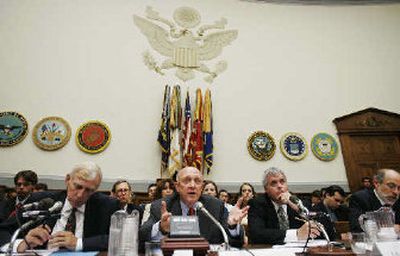U.S. challenged in worldwide race for oil

VIENNA, Austria – Iran, Sudan, Venezuela, Syria – nations shunned by America as nuclear threats, insurgent havens or human rights violators are increasingly being wooed by China and India in a race for oil and influence that is challenging Washington on the energy and security fronts.
The most recent U.S. concerns have focused on China’s bid for Unocal Corp., America’s ninth-largest oil company. American congressmen, senators and former CIA director James Woolsey have described it as a threat to U.S. national security.
But less high-profile maneuvers by the two Asian powerhouses also are raising questions.
Besides their involvement in energy projects worth billions of dollars in countries America views with concern, India and China also have bought into Russia’s oil and gas sector. And Beijing, with Moscow’s apparent blessing, is reaching out to energy-rich former Soviet republics in central Asia where the Americans have military outposts.
As their reach grows, the two countries are receiving increased attention in Washington.
President Bush this week said America’s relationship with China is “a good relationship, but it’s a complex relationship.”
Bush also feted Indian Prime Minister Manmohan Singh at the White House in clear recognition of that country’s growing significance.
The all-out energy offensive by the two Asian powers was documented this year by the National Intelligence Council, the U.S. government think thank which advises the Central Intelligence Agency and senior U.S. policy-makers.
“The likely emergence of China and India as new major global players … will transform the geopolitical landscape,” said the report, titled “Mapping the Global Future.” “In the same way that commentators refer to the 1900s as the ‘American Century,’ the early 21st century may be seen as the time when some in the developing world, led by India and China, come into their own.”
The report also says energy demand through 2020, especially by India and China, “will have substantial impacts on geopolitical relations.”
In Asia’s former Soviet republics, such moves threaten to hurt U.S. interests by skewing alliances in a key part of the world on the doorstep of the oil-rich Caspian basin and also close to Iraq and Afghanistan.
The need for a U.S. military toehold – established during the Afghanistan offensive – is already being questioned by the governments of Uzbekistan and Kyrgyzstan.
The Uzbek Foreign Ministry last month said that other than for overthrowing Afghanistan’s Taliban regime, “any other prospects for a U.S. military presence … were not considered by the Uzbek side.” And a week ago, Kyrgyzstan’s president, Kurmanek Bakiyev, said it was time to “begin discussing the necessity of the U.S. military forces’ presence.”
The Shanghai Cooperation Organization, a regional alliance led by China and Russia, this month called on the United States to set a date for withdrawing forces from the two ex-Soviet republics. Gen. Richard B. Myers, chairman of the U.S. Joint Chiefs of Staff, called it an attempt to “bully” the two U.S. allies – a charge Moscow sharply rejected.
Strategic maneuvering has always been a part of world rivalries and most nations aren’t that choosy – Saudi Arabia, the world’s largest oil producer, remains crucial to Washington despite its human rights record. But the imperative of making friends with energy-rich nations has grown over the past two years as oil prices rise and consumption grows.
Much of the oil – a third of world output – still is pumped by the Vienna-based Organization of Petroleum Exporting Countries, whose powerhouse is Saudi Arabia.
But billions of barrels of the world’s reserves are in countries hostile to the United States such as Iran, OPEC’s second largest oil producer, where U.S. sanctions have locked out American oil companies. Billions more are in countries and regions with uncertain loyalties.
These countries “are a magnet for oil-hungry countries,” says Michael Klare, author of “Blood and Oil: The Dangers and Consequences of America’s Growing Petroleum Dependency.”
Chinese oil demand now is second only to America’s and within 20 years is expected to increase to 21 million barrels a day. That’s what America consumes now – and most of it will be imported. India’s oil consumption over the same period is expected to double to a daily 5.3 million barrels – also mostly imported.